英语专业泛读教程第三册unit12
- 格式:doc
- 大小:236.00 KB
- 文档页数:9
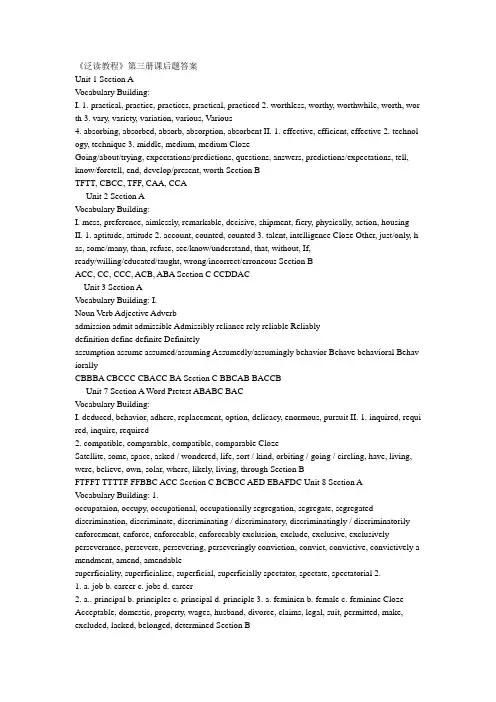
《泛读教程》第三册课后题答案Unit 1 Section AV ocabulary Building:I. 1. practical, practice, practices, practical, practiced 2. worthless, worthy, worthwhile, worth, wor th 3. vary, variety, variation, various, Various4. absorbing, absorbed, absorb, absorption, absorbent II. 1. effective, efficient, effective 2. technol ogy, technique 3. middle, medium, medium ClozeGoing/about/trying, expectations/predictions, questions, answers, predictions/expectations, tell, know/foretell, end, develop/present, worth Section BTFTT, CBCC, TFF, CAA, CCAUnit 2 Section AV ocabulary Building:I. mess, preference, aimlessly, remarkable, decisive, shipment, fiery, physically, action, housing II. 1. aptitude, attitude 2. account, counted, counted 3. talent, intelligence Cloze Other, just/only, h as, some/many, than, refuse, see/know/understand, that, without, If,ready/willing/educated/taught, wrong/incorrect/erroneous Section BACC, CC, CCC, ACB, ABA Section C CCDDACUnit 3 Section AV ocabulary Building: I.Noun Verb Adjective Adverbadmission admit admissible Admissibly reliance rely reliable Reliablydefinition define definite Definitelyassumption assume assumed/assuming Assumedly/assumingly behavior Behave behavioral Behav iorallyCBBBA CBCCC CBACC BA Section C BBCAB BACCBUnit 7 Section A Word Pretest ABABC BACV ocabulary Building:I. deduced, behavior, adhere, replacement, option, delicacy, enormous, pursuit II. 1. inquired, requi red, inquire, required2. compatible, comparable, compatible, comparable ClozeSatellite, some, space, asked / wondered, life, sort / kind, orbiting / going / circling, have, living, were, believe, own, solar, where, likely, living, through Section BFTFFT TTTTF FFBBC ACC Section C BCBCC AED EBAFDC Unit 8 Section AV ocabulary Building: 1.occupataion, occupy, occupational, occupationally segregation, segregate, segregated discrimination, discriminate, discriminating / discriminatory, discriminatingly / discriminatorily enforcement, enforce, enforceable, enforceably exclusion, exclude, exclusive, exclusively perseverance, persevere, persevering, perseveringly conviction, convict, convictive, convictively a mendment, amend, amendablesuperficiality, superficialize, superficial, superficially spectator, spectate, spectatorial 2.1. a. job b. career c. jobs d. career2. a.. principal b. principles c. principal d. principle3. a. feminien b. female c. feminine Cloze Acceptable, domestic, property, wages, husband, divorce, claims, legal, suit, permitted, make, excluded, lacked, belonged, determined Section BBACCB CACCC AABBA C TTF Section C CCAACBUnit 9 Section AV ocabulary Building: 1.1. typifies2. dominant3. familial4. competitive5. vibrate6. descended7. departure8. boom9. co untless 10. symbolizes 2.1. a. recreative b. recreates c. recreation2. a. rhythm b. rhyme c. rhymes d. rhythm ClozeSea, within, of, divides, built/constructed/completed, celebrated, inside/in, attract, together, when Section BFTFTT CCBBC BAACC AC Section C BAACA BCCCC Unit 10 Section AV ocabulary Building: 1.consequence, , consequent / consequential, consequently / consequentially sophisticatiion, sophisti cate, sophisticated, sophisticatedly reference, refer, referable, referablyconversation, converse, conversational, conversationally space, space, spatial/spacious, spatially/s paciouslydetachment, detach, detachable/detached, detachably/detachedly intervention, intervene, interveni ng type, typify, typical, typically 2.1. assure, ensure, assured, ensure2. arises, raised, rise, raised, arisen3. clue, cues, clue, cue ClozeWell, separating / isolating, is, own, close, need, look, order, respect, follow, prior, sign/cue, help, was/were, else Section BBBC TTF BCA CAC TFF Section C TFFTF FFFUnit 11Section AV ocabulary Building: 1.information, inform, informative, informatively specification, specify, specific, specifically addition, add, additional /additive, additionally / additively specialty, specialize, special, specially narration, narrate, narrative, narratively extension, extend, exxtensive, extensively origin, originate , original, originally explosion, explode, explosive, explosively ambiguity, , ambiguous, ambiguou sly establishment, establish, established1. extension2. mabiguity3. orignal4. specified5. additional6. unambiguously7. explosion8. information9. specialized 10. narrative 11. establishment 2. 1. transform, transferred, transferred, transformed 2. lonely, alone, lonely, alone Cloze Library, am ounted, own, burned / destroyed, countries’, send, suggestion / proposal, library Section B ACBCB ACCAC ABABB AB Section C BCACC CBCCCUnit 12 Section AV ocabulary Building:1. reaction, mass, polluting, planetary, suspicious, alarming, emitted, emerged2.1. warned, threatened2. spread, spread, sprayed3. emergency, emergence ClozeSolve, communities, creative, prevention, disposal, resources, recycloing, waste, increase, place, measures, amount Section BFFTT BCAC FTFF ABC CBC Section C BCAAC CBCUnit 13 Section AV ocabulary Building: 1.symptom, symptomize, symptomatic, symptomatically longing, long, longing, longingly addition, add, additional additive, additionally / additively manifestation, manifest, manifest, mani festlydepression, depress, depressed / depressing, depressedly / depressingly invariability, , invariable, i nvariably separation, separate, separate, separatelycondemnation, condemn, condemnable, condemnably imagination, imagine, imaginary, imaginaril y affection, affect, affecting, afeectingly 2.1. remedies, recipe, remedy, recipe2. alternate, altered, alternate, alter3. acknowledged, knowledg e, acknowledged ClozeStep, acknowledge, prevent, essential, physician, due, physical, psychosomatic, disease, confidence, symptoms, thorough, emotional, upsetting Section BCBCAB CBBCB ABCAC Section C TFFFT FTFFF Unit 14 Section AV ocabulary Building: 1. reluctant, evolution, atrributed, catastrophic, assoicate, indifferent, emerge d, stir 2.1. evolved, revolved, evolved2. dismay, dismal, dismal, dismay3. contribute, attributed, contributed, attributed ClozeCharacteristic / trait / nature, changed / had, to, long, get/eat, possessed / developed /had, stretched/lengthened, longer, passed, After, have, theory, effect/influence, notion/idea, change Section B DAB FTFTF DAD BAC FTF Section C TFTFT FTF Unit 15 Section AV ocabulary Building: 1.Prevention, prevent, preventive, preventively Federation, federate, federal, federally Inadequacy, , inadequate, inadequately Deception, deceive, deceptive, deceptively Prosperity, prosper, prosperou s, prosperously Life, live, live/living/aliveEffect, effect, effective, effectivelyEvaluation, evaluate, evaluable /evaluative Resident, reside, residential, residentiallyVision, vision, visional /visionary, visionally / visionarity1. evaluabtion,2. federal3. prosperity4. residential5. effect6. are living7. deceptively8. preventive /effective 2.1. simile, metaphor2. ultimate, unanimous, ultimate, unanimous ClozeTransportation, distance / away, ground, Steam, trains, electric, station /stop, name, train, three, trains, stairs/steps, passengers/people Section BDCDCC CCCAB CB Section C CCACC CCC。
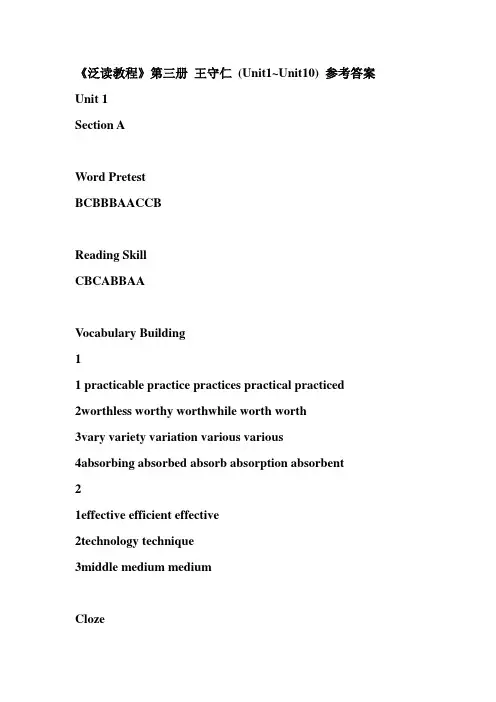
《泛读教程》第三册王守仁(Unit1~Unit10) 参考答案Unit 1Section AWord PretestBCBBBAACCBReading SkillCBCABBAAVocabulary Building11 practicable practice practices practical practiced2worthless worthy worthwhile worth worth3vary variety variation various various4absorbing absorbed absorb absorption absorbent21effective efficient effective2technology technique3middle medium mediumClozegoing expectations questions answers predictions tell know end develop worthSection BTFTT CBCC TFF CAACCASection CFFTFFTTTUnit 2Section AWord PretestABACCABABCCReading SkillCBB FTFFTTVocabulary Building11mess 2preference 3aimlessly 4remarkable 5decisive 6shipment 7fiery 8physically 9action 10housing21aptitude attitude2account counted counted3talent intelligenceClozeother just has some than refuse see that without if ready wrongSection BACCCCCCCACBABASection CCCDDACUnit 3Section AWord PretestABCCBDCDCReading SkillBABCAACBCVocabulary Building1Admission admit admissible admissiblyReliance rely reliable reliablyDefinition define definite definitelyAssumption assume assumed assumedlyBehavior behave behavioral behaviorallyVariety vary various variouslyPart part partial partiallyManager manage managerial manageriallyCorrelation correlate correlative correlativelyAdaptation adapt adaptive adaptively21inspired aspired inspired2token badges token3contemporaries temporary contemporaryClozeCommunicate ways using in of message meet causes meaning to eyesSection BBABBAC FFTTTF CCBSection CBBDDBCCA FFTFFTUnit 4Section AWord PretestCACAABBBCCReading SkillBBACBCCAAVocabulary Building11moist 2betrayal 3exclusively 4inhumane 5amazed 6endangered 7marvels 8deadly21dessert deserted2favourite favorable favorable3awarded reward awardedClozeParents idea at seen landmarks instance migrate guide pole effect it if experimentsSection BCCB FTF BCACCBACCSection CFFTFFFTTFTUnit 5Section AWord PretestCAABCACCCReading SkillCABCB FFTFTTVocabulary Building1Assumption assume assumed assumedlyAcknowledgement acknowledge acknowledgedlyReflection reflect reflective reflectivelyDomination dominate dominant dominantlyCategory categorize categorical categoricallyImplication imply implicative implicativelyReassurance reassure reassuring reassuringlyDefinition define definite definitely21historical historic2rejected resist3test analyzedClozeExisted over head body found language use single passed ahead survival handlingSection BCABCBB TTTFTT CACSection CBBAAACBCUnit 6Section AWord PretestC ACBABACABABReading SkillCAACACCAVocabulary BuildingAvailability avail available availablyConquest conquer conquering conqueringlyLuxury luxuriate luxurious luxuriouslyOrgin orginate original originallyOccurrence occur occurrentSystem systematize systematical systematicallyPhonology (这个是没有动词形式的)phonological phonologicallyDecision decide decided decidedlyVariety vary various variouslySuperiority (这个是没有动词形式的)superior superiorlyPeculiar particular particularAssess access accessResources source sourcesClozeSex men differs compliment complimenting causes makes languages have outside understood have use circleSection BCBBBACBCCCCBACCBASection CBBCABBACCBUnit 7Section AWord PretestABABCBACReading SkillBBBCCBCBVocabulary BuildingDeduced behavior adhere replacement option delicacy enormous pursuitInquired required inquire requiredCompatible comparable compatible comparableClozeSatellite some space asked life sort orbiting have living were believe own solar where likely living throughSection BFTFFTTTTTFFFBBCACCSection CBCBCCAEDEBAFDCUnit 8Section AWord PretestBCABCBBCCAReading SkillCBABCBCCCCVocabulary BuildingOccupation occupy occupational occupationallySegregation segregate segregated(这个没有副词)Discrimination discriminate discriminating discriminatingly Enforcement enforce enforceable enforceablyExclusion exclude exclusive exclusivelyPerseverance persevere persevering perseveringlyConviction convict convictive convectivelyAmendment amend amendable(这个没有副词)Superficiality superficialize superficial superficially Spectator spectate spectatorial (这个没有副词)Job career jobs careerPrincipal principles principal principleFeminine female feminineClozeAcceptable domestic property wages husband divorce claims legal suit permitted make excluded lacked belonged determined Section BBACCCCACCCAABBACTTFSection CCCAACBUnit 9Section AWord PretestBAABCACBBABCReading SkillCACCBBBBBACBVocabulary BuildingTypifies dominant familial competitive vibrate descended departure boom countless symbolizesRecreation recreates recreationRhythm rhyme rhymes rhythmClozeSea within of divides built celebrated inside attract togetherwhenSection BFTFTTCCBBCBAACCACSection CBAACABCCCCUnit 10Section AWord PretestCABCBBBBABReading SkillCBCACCCABBVocabulary BuildingConsequence(这个没有动词形式)consequent consequently Sophistication sophisticate sophisticated sophisticatedly Reference refer referable referablyConversation converse conversational conversationally Space space spatial spatiallyDetachment detach detachable detachablyIntervention intervene intervening(这个没有副词)Type typify typical typicallyAssure ensure assured ensureArises raised rise raised arisenClue cues clue cueClozeWell separating is own close need look order respect follow prior sign help was elseSection BBBCTTFBCACACTFFSection CTFFTFFFF。
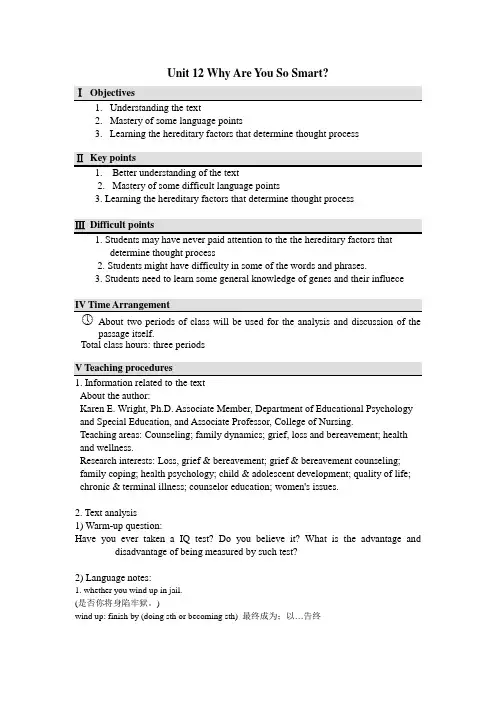
Unit 12 Why Are Y ou So Smart?ⅠObjectives1.Understanding the text2.Mastery of some language points3. Learning the hereditary factors that determine thought process2. Mastery of some difficult language points3. Learning the hereditary factors that determine thought processdetermine thought process2. Students might have difficulty in some of the words and phrases.3.Students need to learn some general knowledge of genes and their influeceIV Time ArrangementAbout two periods of class will be used for the analysis and discussion of the passage itself.Total class hours: three periodsAbout the author:Karen E. Wright, Ph.D. Associate Member, Department of Educational Psychology and Special Education, and Associate Professor, College of Nursing.Teaching areas: Counseling; family dynamics; grief, loss and bereavement; health and wellness.Research interests: Loss, grief & bereavement; grief & bereavement counseling; family coping; health psychology; child & adolescent development; quality of life; chronic & terminal illness; counselor education; women's issues.2. Text analysis1) Warm-up question:Have you ever taken a IQ test? Do you believe it? What is the advantage and disadvantage of being measured by such test?2) Language notes:1. whether you wind up in jail.(是否你将身陷牢狱。

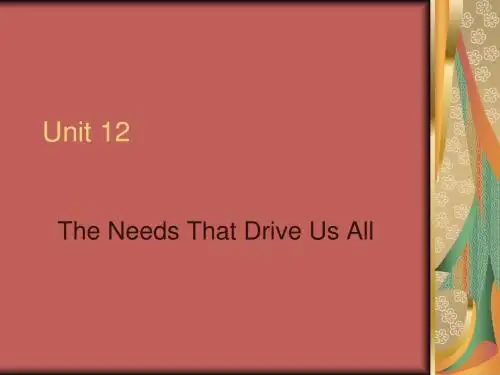

大学英语泛读第三册答案Unit OneLesson 13.1) 废话连篇的人毕竟是个例,不是惯例,我们姑且不谈他们。
可是还有些人,他们说话或说明某些事情的时候,简直不知道什麽时候适可而止。
2)他们急于证明自己的观点,不知什麽时候该打住。
他们似乎以为听众如此低能,以至于听不懂最简单的事,每件事都要多次重复才能灌输到头脑里去。
3)那些有口才的人总是讨人喜欢,随时随地受欢迎他们是聚会和社交场合的中心人物。
4)我想自己掏钱补上差额再简单不过了,肯定事后他还会给我的。
所以,我没有回去向他要钱。
但是,我很快发现我是大错特错了5)辩白使我酿成大错,而沉默使我不可救药。
6)我被施予局部麻醉,好像麻醉没有完全发挥作用,于是我对给我做麻醉的护士诉说,但她不容分说,她说她知道该怎麽做,叫我不要过分挑剔。
7)医生提醒我说会有点疼,因为再打一针麻药是不可能的。
Learning to use phrases and expressions from the text1. 1) obvious 6) dose2) fares 3) administer4) to summon9) elaborate5) revived10) repetition 7) trivial 8) is associated with2. 1) A) to add to an amount required 补足B)to invent (a story) 编造C) to end a quarrel and become friends again 和好D) to form or constitute 构成2)A)the outside limit of an area (床)边B)nervous 紧张不安C) a slight advantage 微弱的优势D) to move slowly and carefully in a particular direction3)A) (obtained) from靠从事……..从……..中挤(过)B) from a particular numberC) without 失去D)because of 出于3. 1)Teenage readers felt he was on their side against their parents and teachers. Older readers felt he was on their side against their bosses at work.2) Many people are uneasy in the company of strangers.3) If you follow these instructions to the letter you will succeed in this task.4) He tends to get a bit carried away when he’s dancing and he startsspinning and leaping all over the place.5) That’s out of the question: Mary is much too busy to look after herchildren.6) I had a lot of quarrels with my parents when I was a teenager.Lesson 22. 1) 他意识到,仅仅阅读那些信件就得用去他一天的大部分时间,何况每天早晨同样又有一堆信件会出现在他的面前。
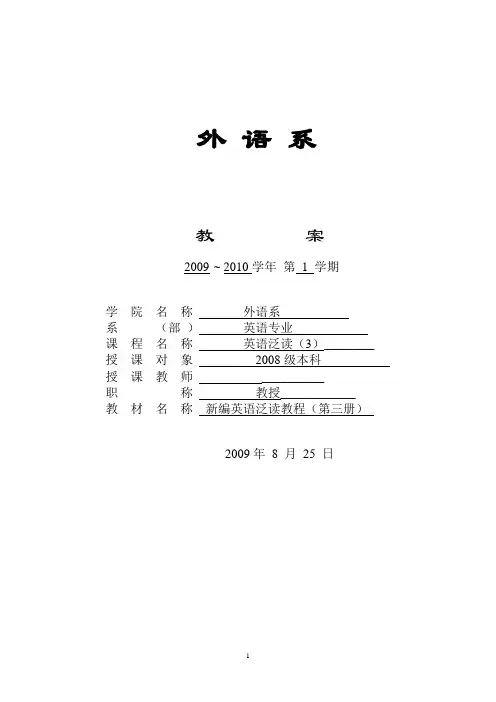
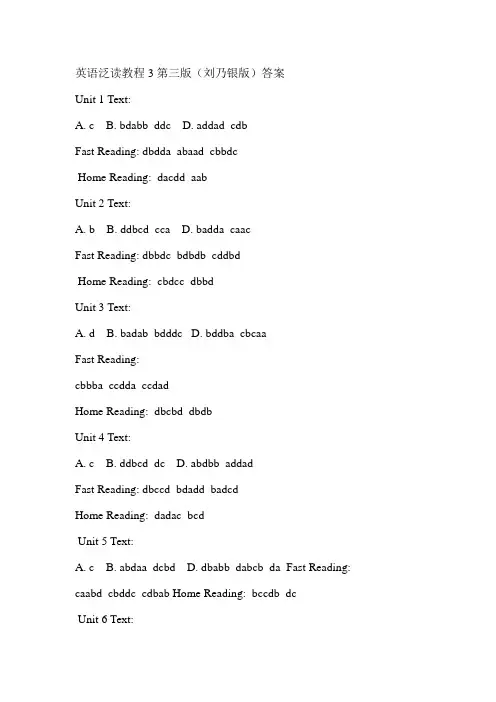
英语泛读教程3第三版(刘乃银版)答案Unit 1 Text:A. cB. bdabb ddc D. addad cdbFast Reading: dbdda abaad cbbdcHome Reading: dacdd aabUnit 2 Text:A. bB. ddbcd cca D. badda caacFast Reading: dbbdc bdbdb cddbdHome Reading: cbdcc dbbdUnit 3 Text:A. dB. badab bdddc D. bddba cbcaaFast Reading:cbbba ccdda ccdadHome Reading: dbcbd dbdbUnit 4 Text:A. cB. ddbcd dc D. abdbb addadFast Reading: dbccd bdadd badcdHome Reading: dadac bcdUnit 5 Text:A. cB. abdaa dcbd D. dbabb dabcb da Fast Reading: caabd cbddc cdbab Home Reading: bccdb dcUnit 6 Text:A. bB. cbcab ddad D. badaa cbaacFast Reading: cabcd aadcb ccdabHome Reading: ccdcd abcUnit 7Text:A. dB. acbda dcaac D. abaac daccd adFast Reading:daada cddbc bdcdb Home Reading: cbadb cddbcUnit 8 Text:A. cB. cddcc dccb D. abdac aaaFast Reading:ccacd bbdad babddHome Reading: dbdbc cbcdUnit 9 Text:A. cB. bccbc dbba D. dcbab dacba c Fast Reading:dcbca bccbc bcddd Home Reading: dcdca bdUnit 10 Text:A. cB. cdccd bacac D. dcdbc acadc bd Fast Reading:dbdcc dccdb bddca Home Reading: cadcb acbbUnit 11 Text:A. dB. adacc dcb D. abacb dcaab adc Fast Reading: dcdab ccbda ccbca Home Reading: bcadb bcdddUnit 12 Text:A. bB. bbbdd ccc D. cdccd acdba dca Fast Reading:bbddc dbdbc cdcdd Home Reading: bcdcc badbb c Unit13 Text:A. cB. cdcad bab D. cbada cabdbFast Reading:cdacc caccd bdbdb Home Reading: bdbcc bdd Unit 14 Text:A. cB. ddcad dab D. dacad babad bFast Reading:ddabb bddca dcccb Home Reading: cdcda ddUnit 15 Text:A. cB. abbac bccdb b D. babcc aaacd bb Fast Reading: caccb accd c ddada Home Reading: cdacd ddc。
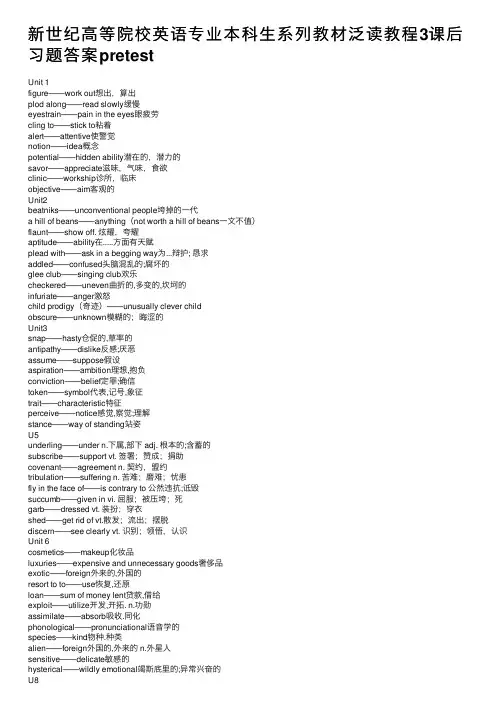
新世纪⾼等院校英语专业本科⽣系列教材泛读教程3课后习题答案pretestUnit 1figure——work out想出,算出plod along——read slowly缓慢eyestrain——pain in the eyes眼疲劳cling to——stick to粘着alert——attentive使警觉notion——idea概念potential——hidden ability潜在的,潜⼒的savor——appreciate滋味,⽓味,⾷欲clinic——workship诊所,临床objective——aim客观的Unit2beatniks——unconventional people垮掉的⼀代a hill of beans——anything(not worth a hill of beans⼀⽂不值)flaunt——show off. 炫耀,夸耀aptitude——ability在.....⽅⾯有天赋plead with——ask in a begging way为...辩护; 恳求addled——confused头脑混乱的;腐坏的glee club——singing club欢乐checkered——uneven曲折的,多变的,坎坷的infuriate——anger激怒child prodigy(奇迹)——unusually clever childobscure——unknown模糊的;晦涩的Unit3snap——hasty仓促的,草率的antipathy——dislike反感;厌恶assume——suppose假设aspiration——ambition理想,抱负conviction——belief定罪;确信token——symbol代表,记号,象征trait——characteristic特征perceive——notice感觉,察觉;理解stance——way of standing站姿U5underling——under n.下属,部下 adj. 根本的;含蓄的subscribe——support vt. 签署;赞成;捐助covenant——agreement n. 契约,盟约tribulation——suffering n. 苦难;磨难;忧患fly in the face of——is contrary to 公然违抗;诋毁succumb——given in vi. 屈服;被压垮;死garb——dressed vt. 装扮;穿⾐shed——get rid of vt.散发;流出;摆脱discern——see clearly vt. 识别;领悟,认识Unit 6cosmetics——makeup化妆品luxuries——expensive and unnecessary goods奢侈品exotic——foreign外来的,外国的resort to to——use恢复,还原loan——sum of money lent贷款,借给exploit——utilize开发,开拓. n.功勋assimilate——absorb吸收.同化phonological——pronunciational语⾳学的species——kind物种.种类alien——foreign外国的,外来的 n.外星⼈sensitive——delicate敏感的hysterical——wildly emotional竭斯底⾥的;异常兴奋的U8feminine——womanly adj.⼥性的.阴性的bias——prejudice n.偏见,偏爱segregate——separated vt.使分离;使隔离prohibit——banned vt.阻⽌.禁⽌enforce——carry out vt.强迫;实施,执⾏institute——establish vt.制定.创⽴turn one's back——ignore 不理睬,置之不理superficial——shallow adj.表⾯的,肤浅的spectator——people n.观众,旁观者gear toward——adapted to 适应,迎合了U9arc——flew in a curve n.弧线incense——sweet smell n. ⾹; ⾹味,⾹⽓dwarf——made appear small n.侏儒 vt.使矮⼩stumble——move slowly and heavily vi. 踌躇;失⾜;犯错beckon——attracted vt. 召唤;吸引cavernous——vast and dark adj.⼤⽽深邃的intricate——complicated adj. 复杂的hustle and hustle——busy action 催促astound——astonished vt. 使惊骇;使震惊antique——ancient and valuable n.古董 adj.古⽼的dilemma——difficult choice 困境gourmet——person who is expert in the choice of food n.美⾷家U10intrusion——disturbances n.闯⼊at stake——at risk 在危急关头threshold——doorway n.极限,门槛valid——acceptable adj. 正当的,有效的convert——change v.变成.改变humiliate——made...feel ashamed vt.使...丢脸;羞辱cue——signal n.提⽰,暗⽰,线索seminar——classes for discussion n,研讨会identify——know vt.识别ultimate——final adj.最终的,根本的U11access——means of approachinng n.接近,进⼊cumulative——increasing in quantity adj.积累的estate transaction——business dealing 房地产交易flourish——prosper n.兴旺,炫耀laborious——wearisome adj.艰苦的,勤劳的,费劲的advent——arrival n.到来,出现dues——money paid for membership n.⼿续费,会费,捐款makeshift——substitute n.权宜之计 adj.临时的,凑活的U12materialize--- to become actual fact使具体化thimbleful--- of very small quantity少量effluent --- liquid waste污⽔,废⽓holocaust--- mass murder屠杀congeal---to become cold and solid凝固,凝结pall---- dark covering覆盖;使乏味loom--- to appear as large shape that is not clear正在逼近的the penny dropped--- things become clearshield--- to protect保护,遮蔽runaway--- not being under control of its owner逃⾛cleanse--- to clean the skin of sth or wound净化.使...纯净fetid--- smelling unpleasant臭的U13manifestation——evidence n.显⽰,表现.⽰威活动remedy——cure vt.治疗.纠正classic——typical adj.古典的,传统的alternate——occur by turns vt,交替,轮流subconscious——unintentionally adv.下意识的,潜意识的convey——communicate vt.传达,运输snap out of = get out of 振作elaborate ——careful adj.精⼼制作的;详尽的condemnation——disapproval n.谴责,定罪persist——continue vt.坚持,固执U15subtle——slight adj.微妙的.敏感的.狡猾的. formulate——work out vt.明确表达;规划poll——questioned vt/n.民意检测,投票legislation ——law n.⽴法,法律survey——study n.调查,测量commute——travels regularly vt.交换;减刑champion——support n.冠军,战⼠ vt.⽀持,拥护set in——starting 即将开始divert——use differently vt.转移testimony——proof n.证据,证词parallel——similarities adj.平⾏的,类似的.相同的U17rampant——widespread adj.猖獗的,蔓延的credibility——believability n. 可信性;确实性spawn——created vt.产卵bizarre——strange adj.奇异的(态度,容貌,款式) exhilarate——exciting vt. 使⾼兴,使振奋ignite ——caused vt.使燃烧;使激动rein in——denied 控制,放慢disavow——restraining vt.抵赖.否认highbrow——cultured adj.卖弄学问的;有⽂化的contain——express vt.包含,控制U3admission admit admissible admissiblyreliance rely reliable reliablydefinition define definite definitelyassumption assume assumed/assuming assumedly/assumingly behavior behave behavioral behaviorallyvariety vary various/varied variously/variedlypart/partiality part partial partiallymanager/management manage managerial managerially correlation correlate correlative correlativelyadaption/adaptation adapt adaptive adaptivelyU5assumption assume assumed / assuming assumedly / assumingly acknowledgement acknowledge acknowledged acknowledgedly reflection reflect reflective reflectivelydomination dominate dominant dominantlycategory categorize categorical categoricallyimplication imply implicative implicativelyreassurance reassure reassuring reassuringlydefinition define definite definitelyU6availability avail available Availablyconquest conquer Conquering / conquered Conqueringlyluxury luxuriate luxurious Luxuriouslyorigin originate original Originallyoccurrence occur Occurrentsystem systematize Systematical / systematic Systematically phonology phonological Phonologicallydecision decide Decided/decisive Decidedly / decisivelyvariety vary various Variouslysuperiority superior SuperiorlyU8occupataion, occupy, occupational, occupationallysegregation, segregate, segregateddiscrimination, discriminate, discriminating / discriminatory, discriminatingly / discriminatorily enforcement, enforce, enforceable, enforceablyexclusion, exclude, exclusive, exclusivelyperseverance, persevere, persevering, perseveringlyconviction, convict, convictive, convictivelyamendment, amend, amendablesuperficiality, superficialize, superficial, superficiallyspectator, spectate, spectatorialU10consequence, , consequent / consequential, consequently/consequentially sophisticatiion, sophisticate, sophisticated, sophisticatedlyreference, refer, referable, referablyconversation, converse, conversational, conversationallyspace, space, spatial/spacious, spatially/spaciouslydetachment,detach, detachable/detached, detachably/detachedlyintervention, intervene, interveningtype, typify, typical, typicallyU11information, inform, informative, informativelyspecification, specify, specific, specificallyaddition, add, additional /additive, additionally / additivelyspecialty, specialize, special, speciallynarration, narrate, narrative, narrativelyextension, extend, exxtensive, extensivelyorigin, originate, original, originallyexplosion, explode, explosive, explosivelyambiguity, , ambiguous, ambiguouslyestablishment, establish, establishedU13symptom, symptomize, symptomatic, symptomaticallylonging, long, longing, longinglyaddition, add, additional additive, additionally / additivelymanifestation, manifest, manifest, manifestlydepression, depress, depressed / depressing, depressedly / depressinglyinvariability, , invariable, invariablyseparation, separate, separate, separatelycondemnation, condemn, condemnable, condemnablyimagination, imagine, imaginary, imaginarilyaffection, affect, affecting, afeectinglyU15Prevention, prevent, preventive, preventivelyFederation, federate, federal, federallyInadequacy, , inadequate, inadequatelyDeception, deceive, deceptive, deceptivelyProsperity, prosper, prosperous, prosperouslyLife, live, live/living/aliveEffect, effect, effective, effectivelyEvaluation, evaluate, evaluable /evaluativeResident, reside, residential, residentiallyVision, vision, visional /visionary, visionally / visionarityU17contradiction contradict contradictory contradictorilycenter center central centrallyseduction seduce seductive seductivelynecessity necessitate necessary necessarilyvisibility visualize visible visiblymobilization mobilize mobilizable mobilizably function function functional functionally dominance dominate dominant dominantly selection select selective selectively vocality vocalize vocal vocally。
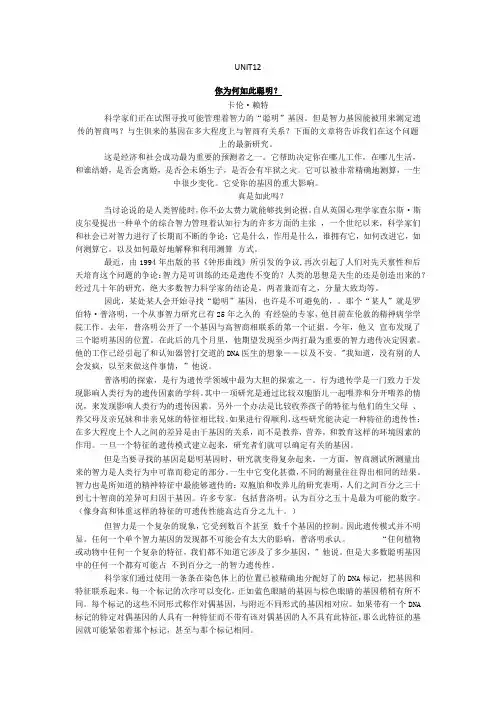
UNIT12你为何如此聪明?卡伦·赖特科学家们正在试图寻找可能管理着智力的“聪明”基因。
但是智力基因能被用来测定遗传的智商吗?与生俱来的基因在多大程度上与智商有关系?下面的文章将告诉我们在这个问题上的最新研究。
这是经济和社会成功最为重要的预测者之一。
它帮助决定你在哪儿工作,在哪儿生活,和谁结婚,是否会离婚,是否会未婚生子,是否会有牢狱之灾。
它可以被非常精确地测算,一生中很少变化。
它受你的基因的重大影响。
真是如此吗?当讨论说的是人类智能时,你不必太费力就能够找到论据。
自从英国心理学家查尔斯·斯皮尔曼提出一种单个的综合智力管理着认知行为的许多方面的主张,一个世纪以来,科学家们和社会已对智力进行了长期而不断的争论:它是什么,作用是什么,谁拥有它,如何改进它,如何测算它,以及如何最好地解释和利用测算方式。
最近,由1994年出版的书《钟形曲线》所引发的争议,再次引起了人们对先天禀性和后天培育这个问题的争论:智力是可训练的还是遗传不变的?人类的思想是天生的还是创造出来的?经过几十年的研究,绝大多数智力科学家的结论是,两者兼而有之,分量大致均等。
因此,某处某人会开始寻找“聪明”基因,也许是不可避免的,。
那个“某人”就是罗伯特·普洛明,一个从事智力研究已有25年之久的有经验的专家,他目前在伦敦的精神病学学院工作。
去年,普洛明公开了一个基因与高智商相联系的第一个证据。
今年,他又宣布发现了三个聪明基因的位置。
在此后的几个月里,他期望发现至少两打最为重要的智力遗传决定因素。
他的工作已经引起了和认知器管打交道的DNA医生的想象――以及不安。
"我知道,没有别的人会发疯,以至来做这件事情,”他说。
普洛明的探索,是行为遗传学领域中最为大胆的探索之一。
行为遗传学是一门致力于发现影响人类行为的遗传因素的学科。
其中一项研究是通过比较双胞胎儿一起喂养和分开喂养的情况,来发现影响人类行为的遗传因素。
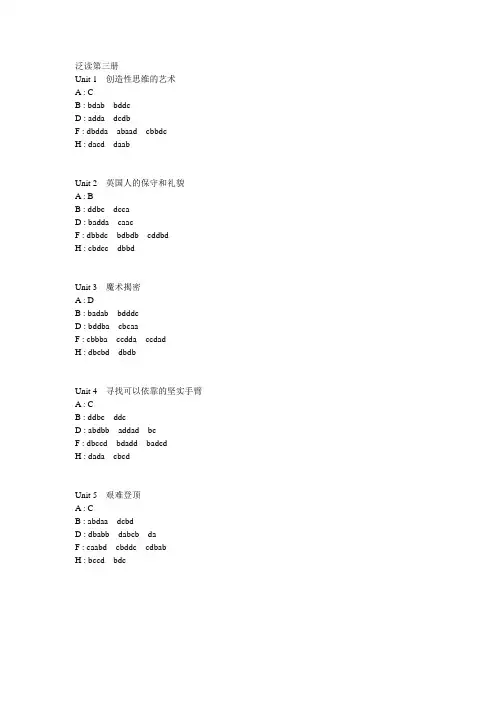
泛读第三册Unit 1 创造性思维的艺术A : CB : bdab bddcD : adda dcdbF : dbdda abaad cbbdcH : dacd daabUnit 2 英国人的保守和礼貌A : BB : ddbc dccaD : badda caacF : dbbdc bdbdb cddbdH : cbdcc dbbdUnit 3 魔术揭密A : DB : badab bdddcD : bddba cbcaaF : cbbba ccdda ccdadH : dbcbd dbdbUnit 4 寻找可以依靠的坚实手臂A : CB : ddbc ddcD : abdbb addad bcF : dbccd bdadd badcdH : dada cbcdUnit 5 艰难登顶A : CB : abdaa dcbdD : dbabb dabcb daF : caabd cbddc cdbabH : bccd bdcUnit 6 药对了,病人错了A : BB : cbcab ddadD : badaa cbaac abF : cabcd aadcb ccdabH : ccdc dabcUnit 7 自己的房间A : DB : acbda dcaacD : abaac daccd adF : daada cddbc bdcdbH : cbadb cddbcUnit 8 假如我有三天光阴A : CB : cddcc dccbD : abda caaaF : ccacd bbdad babddH : dbdbc cbcdUnit 9 梦与睡眠一样重要吗A : CB : bccbc dbbaD : dcbab dacbacF : dcbca bccbc bcdddH : dcdc abdUnit 10 诚信原则A : CB : cdccd bacacD : dcdbc acadc bdF : dbdcc dccdb bddcaH : cadcb acbbUnit 11 非语言交际A : DB : adac cdcbD : abacb dcaab adcF : dcdab ccbda ccbcaH : bcadb bcdddUnit 12 你为何如此聪明A : BB : bbbd dcccD : cdccd acdba dcaF : bbddc dbdbc cdcddH : bcdcc badbbcUnit 13 道德,猿和我们A : AB : cdca dbabD : cbada cabdbF : cdacc caccd bdbdbH : bdbc cbddUnit 14 你怎么知道艺术品的优劣A : CB : ddca ddabD : dacad babadbF : ddabb bddca dcccbH : cdcd addUnit 15 热爱生命A : CB : abbac bccdbbD :babcc aaacd bbF : caccb accdc ddadaH : cdac dddc。
现代大学英语精读3unit12练习答案Unit12 一.Into Chinese1.他那毫无表情的黑眼睛2.他那像啤酒桶一样的胸脯3.一幅办正经事情是有板有眼的样子4.一阵强烈的恐惧感5.崎岖的小路6.一系列复杂的圈圈7.猎狐的全部学问8.狐狸躲避猎人的全部伎俩9.布满茂密树林的山谷10.向四周铺开的树枝11.勉强凑合地12.一个狩猎狂13.世界死一般的寂静14.天空中的一抹暗灰15.树叶组成的屏障16.紧张的肌肉17.憋着的一口气18.异乎寻常的本领19.因恐怖引起的哆嗦20.传遍他的全身21.锐利的眼睛22.伸出的树干23.浓密的植被24.竭尽全力25.猛烈的攻击26.一种平静的消遣活动27.被雷电烧焦的一棵树28.轻轻的脚步声29.削尖了的桩子30.难以想象的一线机会31.一个男人消瘦的身影32.小树的反弹33.房子的阴沉灰色石墙34.一片绿色的水域35.一丝不快36.虽然累但心情十分舒畅的37.一只困兽Into English1.raise one’s eyebrows2.acknowledge one’s defeat3.sip one’s wine4.keep one’s nerve5.leave a trace6.take stock of the situation7.blunder into the swamp8.recover one’s confidence9.varnish the sky10.get down on one’s knees11.hold one’s breath12.smash the enemy13.dress the wound14.sink into the ooze15.tighten one’s belt16.strain one’s eyes17.hum a tune18.shrug one’s shoulder19.snap the gate shut20.strike off from main road21.get a grip on oneself22.concentra te one’s attention on23.postpone the visit24.live a year in a minute二1.kept her nerve/got a grip on herself after a fashion2.being spring futile3.Deliberately uncanny on guard at sake4.dodged at bay pressed on5.But for exceedingly6.scored dense7.stakes fine claimed8.leapt up place of concealment ran for his life9.give away claiming the lives of10.regarding it blundered into a trap三1. A peasant woman found him lying unconscious in the grass. Shecarried him home ,dress his wound after a fashion, and hid him in the attic.2.Had it not been for the shift of focus in our development policyfrom the coastal areas to the central and western regions, the lives of our national ethnic groups would not have improved so rapidly.3.The defense lawyer claimed that the photo was completely outof focus and thus could not be used as evidence.4.Visibility was exceedingly poor and no matter how I strained myeyes, I still couldn’t see so far ahead. I decided that if I wanted to save my neck, it would be foolish to blunder on.5.The mental strain was too much and she began to lose sleep andcould not focus her attention on anything. Finally she had to go to see the doctor who claimed to be some sort of expert. The stupid man declared that her life was at stake and that she needed an immediate brain operation.6.It was a close match.The final score was 98 to 96 in our favor.people were with joy because we had been defeated by their team so many times. For the first time we were able to settle all old score with them.7.Both sides claimed to have scored a point in this confrontation.Neither side wanted acknowledge defeat. But from the point of view of an outsider, actually neither side had score. In this conflict, there was no winner.8.The customer told the waitress that he would like to have someconcubines—he meant to say cucumbers, but his vocabulary was limit. The waitress seem to know what he meant, for she asked,“dressed or undressed”.四1.back neutralize2.fallen out leading away3.gave way down4.rolling/plunging at stake panic grip drive/press5.intend set6.rests indifferent frustrating7.stock bent straightened8.froze lived9.tumbled for10.rare replace11.winding ventured五1.deliciously tired2.open secret3.necessary evil4.eloquent silence5.glorious defeat6.sweet sorrow7.walking corpses8.studied carelessness9.Benevolent despotism10.conspicuous absence11.disagreeable smile12.democratic centralism13.biggest smallGrammar一1.So dedicated wasGalileo2.So real does the imitation diamond ring look3.So rapidly did her reputation rise4.So common are droughts in this area5.So rapidly is progress in information technology6.Only when they remain intellectually alive can7.Only once did he refer to the dictionary8.Only by shouting at the top of his voice was9.Only after I left did I10.Only a few minutes or so before the minister gave orders tocarry it out did二1.I wish I could do the same thing if I were under hiscircumstances.2.But for the heat from the sun, the earth would have been afrozen ball.3.Much to his parents’ surprise, the boy took the liquid medicineas if it were orange juice.4.If I were a young man, I would have gone on themountaineering expedition last month.5.But for the interruption of endless phone calls, he would havecompleted the report.6.The first-prize winner walked past us, with her head held high,as if she had never known us.7.The governing party’s reputation would be serious damaged ifthis were ever made public.8.Throughout the years, the nurse has always treated her youngpatients very carefully as if they were her own children.9.I would not know there exists such a quiet and picturesquevillage but for your article.10.Before dawn an earthquake struck and the entire cityseemed to shake as if in the grip of a giant fist.四年轻女子抬起了客座门扣,让搭车人上来,是一位拎包的老太太。
泛读3Unit12Unit121、toil [t??l] n. productive work (especially physical work done for wages)辛苦,苦工eg I say to the House as I said to Ministers whohave joined this government, I havenothing to offer but blood, toil, sweat and tears.正如我曾对参加本届政府的成员所说的那样,我要对下院说:"我没什么可以奉献,有的,只是热血、辛劳、眼泪和汗水。
v. work hard辛苦工作eg They were toiling at their experiment.他们正在辛苦地做试验。
trench n a ditch dug as a fortification having a parapet of the excavated earth深沟eg;He added:"When you getcloser,the fortress opens up to you thro ugh a narrow trench.他还补充道:“当你走近时,城堡就会通过一条窄窄的沟渠向你敞开。
2、fringe n the outside boundary or surface of something边缘eg And these nationalists are not the fringe.这些爱国者不是边缘势力。
3. trench 英 [tren(t)?] 美 [tr?nt?]n.<1> a long, narrow ditch in the earth;an open ditch for draining.沟,沟渠eg. When you get closer, the fortress opens up to you through a narrow trench.他还补充道:“当你走近时,城堡就会通过一条窄窄的沟渠向你敞开.<2>a deep ditch dug in a zone of battle and held as a defensive position or as a base from which to attack.(军)壕沟eg.We fought with them in the trenches.我们在战壕里与他们作战。
UNIT 1课文一新造词英语中每天都有新词出现。
你知道这些词是怎么产生的吗?阅读下文你就能找到造英语单词的各种方法。
学者们估计英语大约有600 000个单词,不过也许更多。
新的词语不断进入英语,其速度之快,大概没有一本字典能跟得上。
几个世纪以前,源于盎格鲁•撒克逊语、日尔曼语以及法语的原有词汇,占英语的五分之四。
余下的五分之一,一部分由外来词组成,另外的部分由其它三种词组成,它们是:表示人名、地名的专有名词;象声词以及新造的词。
安培、伏特和瓦特都是电学的计量单位,它们都是用发现者的名字命名的,他们分别是是法国物理学家安德烈•M•安培、意大利物理学家阿勒森德罗•伏特、苏格兰工程师兼发明家詹姆士•瓦特。
今天我们都喝用巴氏灭菌法消毒的牛奶,这种奶即清又纯。
巴氏灭菌法便得名于法国医生路易斯•巴斯德,是他发明了消毒牛奶的制作方法。
在英语中像这样的词有许多。
象声词代表它们模仿的事物或行为的声音。
现举例如下:嗡嗡滴答砰砰咕哝喳喳嚎啕扑通啪啪嘀咕咯咯嘤嘤呼哧对于上述单词无需再作任何解释,因为它们不言自明。
或许你还可以想出更多类似的单词来。
接下来是新造的词。
讲英语的人总是根据需要创造词汇,而且每天仍在这样做。
一种新造的词是由另外两个词构成的。
字典里将这种词称为复合词。
如果把“玩耍”和“物品”放在一起,我们就可以得到复合词“玩具”。
你还能为下表添加多少类似的词呢?雨衣奶昔楼上停顿前灯关闭帆船楼下收入标题除了把两个词放在一起之外,我们还可以给单词添加一些成分,即前缀和后缀。
大多数前缀和后缀来自拉丁语和希腊语,而且它们都有自己特别的意义。
当我们在词的前面加前缀或在其后面加后缀时,我们就改变了它的意思。
例如,前缀re-意思为“再”。
如果把re-加到“作”或者“画”的前面,我们就得到了两个新词,意思为“再作一次”和“再画一次”。
Un-意思为“相反的”或者“不”。
把un-加到“快乐的”或者“和蔼的”前边,我们就得到了“不快乐”和“不和蔼”。
Keys to Reading Course 3 Unit 1 Reading StrategiesSection AWord Pretest1-5. BCBBB 6-10.AACCBReading Skill2-5. CBCA 6-9. BBAAVocabulary Building1.a. practicable/practicalb. practicec. practicesd. practicable/practicale. practiceda. worthlessb. worthyc. worthwhiled. worthe. wortha. varyb. varietyc. variationd. various/variede. Variousa. absorbingb. absorbedc. absorbd. absorptione. absorbent2.1. a. effective b. efficient c. effective2. a. technology b. technique3. a. middle b. medium c. mediumClozegoing/about/trying expectations/predictions questions answerspredictions/expectations tell know/foretell end develop/present worthSection B1-5. TFTTC 6-10. BCCTF 11-14: FCAAC 16-17: CA Section C1-5. FFTFF 6-8. TTTUnit 2 EducationSection AWord Pretest1-5. ABACC 6-8. ABAReading Skill4-6. CBB 1-6. FTFFTTVocabulary Building1.mess2. preference3. aimlessly4. remarkable/marked5. decisive6.shipment7. fiery8. physically9. action10. housing2.1. a. aptitude b. attitude2. a. account b. counted c. counted3. a. talent b. intelligenceClozeother just/only has some/many than refuse see/know/understandthat without If ready/willing/educated/taught wrong/incorrect/erroneousSection B1-5. ACCCC 6-10. CCCAC 11-14: BABASection C1-6. CCDDACUnit 3 Body Language Section AWord Pretest1-5. ABCCB 6-9. DCDCReading Skill2-5. BABC 6-10. ACCBCVocabulary BuildingUse of English1.Noun Verb Adjective Adverb admission admit admissible admissiblyreliance rely reliable reliably definition define definite definitely assumption assume assumed/assuming assumedly/assuminglybehavior behave behavioral behaviorally variety vary various/variedvariously/variedlypart/partiality part partial partially manager/management manage managerial manageriallycorrelation correlate correlative correlatively adaption/adaptation adapt adaptive adaptively2.1. a. inspired b. aspired c. inspired2. a. token b. badges c. token3. a. contemporaries b. temporary c. contemporaryClozecommunicate ways/means//ones using/saying in of messagemeet/have/encounter/experience causes meaningtoSection B1-5. BABBA 6-10. CFFTT 11-15: TFCCB Section C1-5. BBDDB 6-10. CCAFF 11-14. TFFTUnit 4 AnimalsSection AWord Pretest1-5. CACAA 6-10. BBBCCReading Skill2-5.BBAC 6-10. BCCAAVocabulary Building1.1. moist2. betrayal3. exclusively4. inhumane5. amazed/amazing6.endangered 7. marvels 8. deadly2.1. a. dessert b. deserted2. a. favorite b. favorable c. favorable3. a. awarded b. reward c. awardedClozeparents idea at/by seen landmarksinstance/example migrateguide/direct pole effect/influence It/Thisif/whether experimentsSection B1-5. CCBFT 6-10. FBCAC 11-15: CBACC Section C1-5. FFTFF 6-10. FTTFTUnit 5 HistorySection AWord Pretest1-5. CAABC 6-9. ACCCReading Skill2-6.CABCB 1-6. FFTFTTVocabulary Building1.Noun Verb Adjective Adverb assumption assume assumed / assuming assumedly / assumingly acknowledgement acknowledge acknowledged acknowledgedlyreflection reflect reflective reflectivelydomination dominate dominant dominantly category categorize categorical categoricallyimplication imply implicative implicatively reassurance reassure reassuring reassuringlydefinition define definite definitely 2.1. a. Historical b. history2. a. rejected b. resist3. a. test/analyze b. analyzeClozeexisted/appeared over head/brain body found languageuse/value/significance/important single passed ahead survival/existenceSection B1-5. CABCB 6-10. BTTTF 11-15: TTCAC Section C1-5. BBAAA 6-8. CBCUnit 6 LanguageSection AWord Pretest1-5. CACBA 6-12. BACABABReading Skill3-5.CAA 6-10. CACCAVocabulary Buildingavailability avail available availably conquest conquer Conquering / conquered Conqueringlyluxury luxuriate luxurious Luxuriously origin originate original originally occurrence occur occurrentsystem systematizeSystematical / systematic systematically phonology phonological Phonologically decision decide decided/decisive decidedly / decisivelyvariety vary various variously superiority superior Superiorly2.1. a. peculiar b. particular c. particular2. a. assess b. access c. access3. a. resources b. source c. sourcesClozesex Men differs compliment/word complimenting causes makeslanguages have outside understood have use circle/world/fieldSection B1-5. CABBA 6-10. CBCCC 11-17: CBACCBA Section C1-5. BBCAB 6-8. BACCBUnit 7 SpaceSection AWord Pretest1-5. ABABC 6-8. BACReading Skill1-5.BBBCC 6-8. BCBVocabulary Building1. deduced2. behavior3. adhere4. replacement5. option6. delicacy7.enormous 8. pursuit2.1. a. inquired b. required c. inquire d. required2. a. compatible b. comparable c. compatible d.comparableClozesatellite some space asked/wondered lifesort/kind orbiting/going/circlinghave living were believe own solar where likely livingthroughSection B1-5. FTFFT 6-10. TTTTF 11-15: FFBBC 16-18. ACC Section C1-5. BCBCC 6-8. AED1-6. EBAFDCUnit 8 WomenSection AWord Pretest1-5. BCABC 6-10. BBCCAReading Skill1-5. CBABC 6-10. BCCCCVocabulary Buildingoccupataion, occupy, occupational, occupationally segregation, segregate, segregated discrimination, discriminate,discriminating / discriminatory, discriminatingly / discriminatorily enforcement, enforce, enforceable, enforceably exclusion, exclude, exclusive, exclusively perseverance, persevere,persevering,perseveringlyconviction, convict, convictive, convictively amendment, amend, amendable superficiality, superficialize, superficial, superficiallyspectator, spectate, spectatorial2.1. a. job b. career c. jobs d. career2. a. principal b. principles c. principle d. principle3. a. feminine b. female c. feminineClozeacceptable domestic property wages husband divorce claims legalsuit permitted make excluded lacked belonged determinedSection B1-5. BACCC 6-10. CACCC 11-15. AABBA 16-19.CTTFSection CAACBUnit 9 CitiesSection AWord Pretest1-5. BAABC 6-10. ACBBAReading Skill1-5. CACCB 6-12. BBBBACBVocabulary Building1.1. typifies2. dominant3. familial4. competitive5. vibrate6. descended7. departure 8. boom 9. countless 10. symbolizes 2.1. a. recreation b. recreate c. recreation2. a. rhythm b. rhyme c. rhymes d. rhythm Clozesea within of dividesbuilt/constructed/completed celebrated inside/inattract together whenSection B1-5. FTFTT 6-10. CCBBC 11-17. BAACCAC Section C1-5. BAACA 6-10. BCCCCUnit 10 Cross-cultural Communication Section AWord Pretest1-5. CABCB 6-10. BBBABReading Skill1-5. CBCAC 6-10. CCABBVocabulary Buildingconsequence, consequent / consequential, consequently / consequentially sophisticatiion, sophisticate, sophisticated, sophisticatedlyreference, refer, referable, referably conversation, converse, conversational, conversationallyspace, space, spatial/spacious,spatially/spaciouslydetachment, detach,detachable/detached, detachably/detachedlyintervention, intervene, interveningtype, typify, typical, typicall2.1. a. assure b. ensure c. assured d. ensure2. a. arises b. raised c. rise d. raised e. arisen3. a. clue b. cues c. clue d. cueClozewell separating/isolating is own close need look order respectfpllow prior sign/cue help was/were else Section B1-5. BBCTT 6-10FBCAC 11-15. ACTFF Section C1-8. TFFTFFFFUnit 11 Information Retrieval Section AWord Pretest1-5. ACBCB 6-8. ABBReading Skill1-5. BCBAC 6-10. CCCCCVocabulary Buildinginformation, inform, informative, informativelyspecification, specify, specific, specifically addition, add, additional /additive, additionally / additivelyspecialty, specialize, special, specially narration, narrate, narrative, narratively extension, extend, exxtensive, extensively origin, originate, original, originally explosion, explode, explosive, explosively ambiguity, , ambiguous, ambiguously establishment, establish, established1. extension2. ambiguity3. original4. specified5. additional6.unambiguously7. explosion8. information 9. specialized 10. narrative11.established2.1. a. transform b. transferred c. transferred d. transformed2. a. lonely b. alone c. lonely d. aloneClozelibrary amounted own burned/destroyed by countries sendsuggestion/proposal librarySection B1-5. ACBCB 6-10. ACCAC 11-17. ABABBAB Section C1-5. BCACC 6-10. CBCCCUnit 12 Environment Section AWord Pretest1-5. CCBBC 6-12. AACCCBAReading Skill1-5. CABBC 6-10. CBBVocabulary Building1.1. reaction2. mass3. polluting4. planetary5. suspicious6. alarming7.emitted 8. emerged2.1. a. warned b. threatened2. a. spread b. spread c. sprayed3. a. emergency b. emergenceClozesolve communities creative prevention disposal resources recyclingwaste increase place measures amount Section B1-5. FFTTB 6-10. CACFT 11-18. FFABCCBC Section C1-8. BCAACCBCUnit 13 MedicineSection AVocabulary Building:1.symptom,symptomize,symptomatic, symptomaticallylonging, long, longing, longinglyaddition, add, additional/additive, additionally / additivelymanifestation, manifest, manifest, manifestly depression, depress, depressed / depressing, depressedly / depressinglyinvariability, , invariable, invariably separation, separate, separate, separately condemnation,condemn,condemnable,condemnably imagination, imagine, imaginary, imaginarily affection, affect, affecting, afeectingly2.1. remedies, recipe, remedy, recipe2. alternate, altered, alternate, alter3. acknowledged, knowledge, acknowledged ClozeStep, acknowledge, prevent, essential, physician, due, physical, psychosomatic, disease, confidence, symptoms, thorough, emotional, upsetting Section BCBCAB CBBCB ABCACSection CTFFFT FTFFFUnit 14 EvolutionSection AVocabulary Building:1. reluctant, evolution, atrributed, catastrophic, assoicate, indifferent, emerged, stir2.1. evolved, revolved, evolved2. dismay, dismal, dismal, dismay3. contribute, attributed, contributed, attributed ClozeCharacteristic / trait / nature, changed / had, to,long, get/eat, possessed / developed /had, stretched /lengthened, longer, passed, After, have, theory, effect/influence, notion/idea, changeSection BDAB FTFTF DAD BAC FTFSection C TFTFT FTFUnit 15 TransportationSection AVocabulary Building:1. Prevention, prevent, preventive, preventively Federation, federate, federal, federally Inadequacy, , inadequate, inadequately Deception, deceive, deceptive, deceptively Prosperity, prosper, prosperous, prosperously Life, live, live/living/aliveEffect, effect, effective, effectively Evaluation, evaluate, evaluable /evaluative Resident, reside, residential, residentially Vision, vision, visional /visionary,visionally / visionarity1. evaluabtion,2. federal3. prosperity4. residential5. effect6. are living7. deceptively8. preventive /effective2.1. simile, metaphor2. ultimate, unanimous, ultimate, unanimous ClozeTransportation, distance / away, ground, Steam, trains, electric, station /stop, name, train, three, trains, stairs/steps, passengers/people Section BDCDCC CCCAB CBSection CCCACC CCC。
泛读教程第三册cloze答案原文Unit1. The ability to predict what the writer is going/ about/ trying to say next is both an aid to understanding and a sign of it.A prediction begins from the moment you read the title and from expectations of what he book is likely to contain. Even if the expectations/predictions are contradicted, they are useful because they have started you thinking about the topic and made you actively involved.If you formulate your predictions as questions which you think the text may answer, you are preparing yourself to read for a purpose: to see which of your questions are in fact dealt with and what answers are offered. If your reading is more purposeful you are likely to understand better.Naturally your predictions/expectations will not always be correct. This does not matter at all as long as you recognize when they are wrong, and why. In fact mistaken predictions can tell you the source of misunderstanding and help you to avoid certain false assumptions.Prediction is possible at a number of levels. From the title of the book you can know/foretell the topic and the possibly something about the treatment. From the beginning of the sentences, you can often predict how the sentence will end. Between these extremes, you can predict what will happen next in a story, or how a writer will develop/present his argument, or what methods will be used to test a hypothesis.Because prediction ensures the reader’s active involvement, it is worth training./doc/f215401730.html,cation is not anend, but a means to an end. In other words, we do not educate children just/only for the purpose of educating them. Our purpose is to fit them for life.In many modern countries it has for some time been fashionable to think that, by free education for all, one can solve all the problems of society and build a perfect nation. But we can already see that free education for all is not enough; we find in some/many countries a far larger number of people with university degrees than there are jobs for them to fill. Because of their degrees, they refuse to do what they think to be "low" work, and, in fact, work with hands is thought to be dirty and shameful in such countries.But we have only to think a moment to see/know/understand that the work of a completely uneducated farmer is far more important than that of a professor. We can live without education, but we die if we have no food. If no one cleaned our streets and took the rubbish away from our houses, we should get terrible diseases in our towns.In fact, when we say that all of us must be educated to fit ourselves for life, it means that we must be ready/willing/educated/taught to do whatever job suited to our brain and ability, and to realize that all jobs are necessary to society, that is very wrong/incorrect/erroneous to be ashamed of one's work or to scorn someone else’s. Only such a type of education can be called valuable to society.Unit3. Human beings learn to communicate with each other will nonlinguistic means as well as linguistic ways/means/ones. All of us are famil iar with the say it wasn’t what he said; it was the way that he said it when, by using/saying the word way we mean something about the particular vice quality that was inevidence., or the set of a shoulder, or the obvious tension of certain muscles. A message may even be sent by the accompanying tone and gestures, so that each of I’m ready, you are beautiful, and I don’t know where he is can mean the opposite of any such interpretation. Often we have/meet/encounter/experience difficulty in finding exactly what in the communication causes the change of meaning, and any statement we make leads to the source of the gap between the literal meaning of the words and the total message that is likely to be expressed in impressionistic terms. It is likely to refer to some thing like a “glint” in a person’s eyes, or a “threatening” gesture, or “provocative” manner.Unit4. How do the birds find their way on their enormously long journeys? The young birds are not taught the road by their parents, because often the parents fly off first. We have no idea how the birds find their way, particularly as many of them fly at/by night, when landmarks could hardly be seen. And other birds migrate over the sea, where there are no landmarks at all.A certain kind of plover, for instance/example, nests in Canada. At the end of the summer these birds migrate from Canada to South America; they fly 2,500 miles, non-stop, over the ocean. Not only is this very long flight an extraordinary feat of endurance, but there are no landmarks on the ocean to guide/direct the birds.It has been suggested that birds can sense the magnetic lines of force stretching from the north to south magnetic pole of the earth, and so direct themselves. But all experiments hitherto made to see whether magnetism has any effect/influence whatsoever on animals have given negative results. Still, where there is such a biological mystery as migration, even improbableexperiments are worth trying. It/this was being done in Poland, before the invasion of that country, on the possible influence of magnetism on path-finding. Magnets were attached to the birds’ heads to see if/whether their direction-sense was confused thereby. These unfinished experiments had, of course, to be stopped.Unit5. Man first existed on earth half a million years ago. Then he was little more than an animal; but early man had several big advantages over the animals. He had a large head/brain, he had an upright body, he had clever hands; he had in his brain special groups of nerve cells, not found in animals, that enabled him to invent a language and use it to communicate with his fellow men. The ability to speak was of very great use/value/significance/importance because it was allowed men to share ideas, and to plan together, so that tasks impossible for a single person could be successfully under-taken by intelligent team-work. Speech also enabled ideas to be passed on from generation to generation so that the stock of human knowledge slowly increased.It was these special advantages that put men far ahead of all other living creatures in the struggle for survival/existence. They can use their intelligence handing/overcoming their difficulties and master them.Unit6. Language varies according to sex and occupation. The language of man differs subtly from that of women. Men do not usually use expressions such as “its darling,” and women tend not to swear as extensively as men. Likewise, the language used in addressing men and women differs subtly: we can compliment a man on a new necktie with the compliment/words“what a pretty tie, that is!” but not with “how pretty you look today!”---- an expression reserved for complimenting a woman. The occupation of a person causes his language to vary, particular in the use he makes of technical terms, that is, in the use he makes of the jargon of his vacation. Soldiers, dentist, hairdressers, mechanics, yachtsmen, and skiers all have their particular special languages. Sometimes the consequence is that such persons have difficulty in communicating with people outside the vacation on professional maters because the technical vocabulary is not understood by all. Although we can relate certain kinds of jargon to levels of occupation and professional training, we must also note that all occupations have some jargon, even these of the criminal underworld. There may well be a more highly developed use of jargon in occupations that require considerable education, in which words, and the concepts they use, are manipulated rather than objects, for example in the legal and teaching circle/world/field and in the world of finance.Unit7. The space age began on October 4, 1957, when Sputnik I was launched. This first man-made satellite was followed by many others, some of which went around the sun. Now the conquest of the space between the planets, and between the earth and the sun, continues at a rapid rate.Each mew satellite and space probe gives scientists new information. As men explore outer space, some of the questions they have long asked/wondered about will be answered at last.The greatest question of all concerns life itself. Is there intelligent life out side the earth? Are there people, or creatures of some sort/kind living on Mars, Venus, or some other planet of the solar system? Are there planets orbiting/going/circling around stars other than our sun?The only kind of life we know about would have to be upona planet. Only a planet would have the temperatures and gas that all living things seem to need. Until a short time ago, we thought there were only a few planets. T oday, scientists believe that many stars have planets going around them.We know that there are nine planets in our own solar system-Mercury, Venus, Earth, Mars, Jupiter, Saturn, Uranus, Neptune and Pluto. If any other planets exist in our solar system, or anywhere else, our telescopes are not powerful enough to pick up their feeblereflected light. But astronomers guess that one star in a hundred has at least one planet where life could exist.We are quite sure that life could begin on a young planet. A new plant would be likely to contain great seas, together with heavy clouds of water vapor and other gases. Electric storms would be common. It is possible that simple living cells might from when electricity passed through the clouds. An experiment made in 1952 at the University of Chicago seems to prove this. By passing electricity through nonliving materials, scientist made cells like those of living creatures.Unit8. At the beginning of the nineteenth century the only acceptable roles for women were domestic there was virtually nothing for them to do except stay at home or hire out as maids, governesses, and, before long, teachers. Women were not allowed to own property-in most cases, not even the clothes they wore. A working wife was not allowed to keep her wages but was required to turn them over to her husband. In case of separation or divorce, a woman had no legal claims on her husband and was not allowed to keep the children. She had to legal status, which meant that she was not permitted to bring suit or to give testimony in courts. Often, she was not permitted to inheritproperty or to make a will. She was barred from public office and excluded form public life generally. For the most part, women lacked opportunities for education, vocational training, and professional employment. The national consensus was that women belong in the home, and determined efforts were made to see that they stayed there.Unit9. Sydney’s best feature is her harbor. Most Sydneysid ers can see at least a glimpse of blue sea from their windows. Nearly everyone lives within an hour from a beach. On weekends sails of all shapes, sizes and colors glide across the water. Watching the yacht races is a favorite Saturday activity.The harbor divides Sydney into north and south sections. The harbor bridge connects the two. It was built in 1932 and cost 20 million.Another Sydney symbol stands on the harbor shore. Sydney’s magnificent opera house celebrated its 20th anniversary last year. Danish designer Jorn Utzon won an international contest with his design. The structure contains several auditoria and theaters. But not all concerts are held in the building. Sunday afternoon concerts on th e building’s outer walk attract many listeners.Sydney’s trendy suburb is Paddington. Houses are tightly packed together. Many were first built for Victorian artists. Now fashionable shops, restaurants, arts galleries and interesting people fill the area. The best time to visit is Saturday, when vendors sell everything. So there is one of the world’s most attractive cities --- Sydney, Austrian.Unit 10 Architectural design influences how privacy is a chieved as well as how social contact is made in public places. The concept of privacy is not unique to a particular culture butwhat it means is culturally determined.People in the United States tend to achieve privacy by physically separating themselves from others. The expression “good fences make good neighbors” is a preference for privacy from neighbors’ homes. If a family can afford it, each child has his or her own bedroom. When privacy is needed, family members may close their bedroom doors.In some cultures when individuals need privacy, it is acceptable for them simply to look into themselves. That is, they do not need to remove themselves physically from a group in order to achieve privacy.Young American children learn the rule “knock before you enter” which teaches them to respect others’ privacy. Pa rents, too, often follow this rule prior to entering their children’s rooms. When a bedroom door is closed it may be a(n) sign to others saying, “I need privacy,” “I’m angry,” or “Do not disturb. I’ busy.” For Americans, the physical division of space and the use of architectural features permit a sense of privacy. The way space is used to help the individual to achieve privacy, to build homes or to design cities if culturally influenced. Dr. Hall summarizes the relationship between individuals and their physical surroundings:Man and his extensions constitute one interrelated system. It is a mistake to act as though man was one thing and his house or his cities, or his language wee something else.Unit11. The Library of Congress is the largest library in the world. Its books, pamphlets, documents, manuscripts, official, papers, photographs, and prints amount to some 86 million items---a number that swells day by day----housed on 535 miles of shelves.Congress authorized a library in 1800, which amounted to three thousand books and afew maps when it was destroyed when the British burned the Capitol in 1814. to replace it, Thomas Jefferson sold the government his own library of almost 6500 volumes---the finest in the nation at the time. The collection, again housed in the Capitol, had grown to 55000 when a fire burned more than half of it. In 1866 a portion of the Smithsonian Institution’s library was added to the library of Congress, and in the same year the government entered an international program by which copies of U.S. documents were exchanged for those of other countries. The copyright law of 1870 ensured the library would always be up to date by requiring publishers to send two copies of each book published to the library in order to obtain copyright.By 1870 the collections had outgrown its Capitol quarters. A suggestion to raise the Capitol dome and fill it with bookshelves was rejected, and in 1873 Congress authorized a competition for the design of a library building. A variety of disputes delayed co nstruction for more than a de cade, but the library’s Thomas Jefferson Building was finally opened in 1897.Unit12. As a nation, we starting to realize that we can’t solve the solid waste dilemma just by finding new places to put trash. Across the country, many individuals, communities and business have found creative ways to reduce and better manage their trash through a coordinated mix of practices that includes source reduction.Simply put source reduction is waste prevention. It includes many actions that reduce the disposal amount and harmfulness of waste created. Source reduction can conserve resources, reduce pollution, and help cut waste disposal and handing costs(it avoids the costs of recycling, landfilling, and combustion).Source reduction is a basic solution to too much garbage: less waste means less of a waste problem. Because source reduction actually prevents the increase of waste in the first place, it comes before other measures that deal with trash after it is already generated. After source reduction, recycling is the preferred waste management option because it reduces the amount of waste going to landfills and conserves resources.Unit13. The first step in helping the patient is to accept and acknowledge his illness. The cause of symptoms must be found, and measures to relieve them and to prevent recurrence must be taken. Thorough examinations are essential. Although the physician may suspect that the illness is due to emotional rather than physical cause, he must search carefully for any evidence of physical disease. It is not unknown for an illness considered psychosomatic to be later diagnosed as cancer or some other disease. The thorough search for physical causes of the symptoms helps to gain the patient’s confidence. He knows that his condition and symptoms are being taken seriously. If no organic basis for his complaints is found, he usually will find this news easier to accept when he knows he has had a thorough examination. Finding no physical cause for the disorder points the way to understandi ng the patient’s condition. What is the cause? Is it emotional stress? If so, what kind? What are the problems which are upsetting the patients?Unit14. The work of French scientist Jean Baptiste Lamarck (1744-1829) has contributed to the theory of evolution. Lamarck believed that the environment shaped the nature/trait/characteristic of plant and animal life. he believed that the bodies of plants and animals changed/had to fit theirenvironment and a useful physical change would be passed on to the plant’s or animal’s offspring.For example, Lamarck thought that giraffes developed long necks because they had to stretch to get/eat the leaves of tall trees for food. Lamarck didn’t think that giraffes possessed/developed/had long necks all at once, however. He thought that the earliest group of giraffes stretched/lengthened their necks a small amount. Their offspring inherited this longer neck. The offspring then stretched their necks a little bit longer. They passed this even longer neck on to their own offspring. After many generations, giraffes developed the long necks that they have today.Not all of Lamarck’s theory is accepted today. Most scientists do not believe that the environment has a(n) effect/influence on the evolution of life forms. Nut t hey don’t agree with the notion/idea that a physical change in a plant’s or animal’s body is passed on to the offspring. Instead, they believe that a change must occur in the plant’s or animal’s cells before a change in offspring can take place.Unit15.In a very big city, in which millions of people live and work, fast, frequent means of transportation are of the greatest importance. In London, where most people live long distance/away from their work, all officers, factories and schools would have to choose if the buses, the trains and the Underground stopped work.Originally the London Underground had steam trains which were not very different from other English trains, except that they went along in big holes under the ground in order to keep away from the crowded city above their heads. Steam trains used coal, which filled the underground stations with terrible smoke. As aresult, the old trains were taken away, and electric ones put in their place. Now the London Underground is very clean, and the electric trains make faster runs possible.At every Underground station/stop there are maps of all the Underground lines in London, so that it is easy to see how to get wherever one wants to go. Each station has its name written up clearly and in large letters several times, so that one can see when one comes to where one must get out. At some stations one can change to a different underground train, and in some places, such as Piccadilly, there are actually three lines crossing each other. The trains on the three lines are not on the same level, so that there should not be accidents. T o change trains, one has to go up or down some stairs to a new level. It would be tiring to have to walk up these stairs/steps, so the stairs are made to move themselves, and all that the people/passengers have to do is to stand and be carried up or down to where they wish. In fact, everything is done to make the Underground fast and efficient.Unit16.Why “grandfather” clock? Well, these clocks were passed through the family and so were always thought of as “grandfather’s clock.” But the first domestic timepieces were hung from a nail on the wall. Unfortunately dust got into the works and even worse children used to swing from the weights and the pendulum. So first the face and works and then the weights and the pendulum were protected by wooden cases. Before long the clock was nearly all case and was stood on the ground/floor and called, not surprisingly, a long-case clock. These “grandfather” clocks were very expensive, m ade as they were from fine wood, often beautifully carved or decorated with ivory. Famous makers of this period included Thomas Tompion, John Harrison and Edward East, but don’t get too excited if youfind that the clock Grandma left you has one of these names on the back. Before you start jumping up and downing and shouting, “we’re rich, we’re rich,” remember that plenty of people before the 20th century had the idea of making cheap clocks/timepieces of famous original and “borrowing” the names of their be tt ers. And don’t forget that the first chiming mechanism wasn’t invented/created/made until 1695, so a chiming clock, however charming it sounds, will date from the 18th century. A fake/false/imitated late 17th century grandfather clock made by East sold recently for just under 20000.Unit17. Suppose you send your child off to the movies for three hours next Sunday. And three hours on Monday and the same number of hours Tuesday, Wednesday, Thursday, Friday, and Saturday. Thus is essentially what is happening to the average child in American today, except it is not the screen in the movie house down the street he sits in front of, it is instead the television set right in your own house.According to the Nielsen Index figures for TV viewing, it is dais that by the time a child graduates from high school he has had 11000 hours of schooling, as opposed to 15000 hours of viewing. I would like to repeat that. By the time the child is 18 years old, he has spent more hours in front of TV than he has in school. Over TV he will have witnessed by that time some 18000 murders and countless highly detailed cases of robbery, arson, bombing, shooting, beatings, forgery, smuggling, and torture---averaging approximately cone per minute in the standard television cartoon for children under the age of ten. In general, seventy-five percent of all network dramatic programs contain violence.Dr. Albert Bandura of Standford University reaches/drawstwo conclusions about violence on TV: (1) that it tends to reduce the child’s inhibi ti ons against acting in a violent, aggressive manner, and (2) that children will imitate what they see. Dr. Bandura points out that a child won’t necessarily run out and attack the first person he sees after watching violence on the screen, but that, if provoked later on, he may very well put what he has learned into practice.One of the lessons of television is that, violence works. If you have a problem with someone, the school of TV says to slap him in the face, stab him in the back. Because most of the program has shown how well violence has paid off, punishment at the end tends not to have much of an inhibitory effect.。
英语专业泛读教程第三册unit12materialize [mə'tiəriəlaiz] vi. 实现,成形;突然出现vt. 使具体化,使有形;使突然出现;使重物质而轻精神Materialize View物化视图Quietly Materialize悄悄地实现Help To Materialize促成materialize v .物化fail to materialize不遂un-materialize非物化About To Materialize有眉目adj. material 重要的;物质的,实质性的;肉体的adv. materially 实质地;物质上;极大地n. material 材料,原料;物资;布料materialism 唯物主义;唯物论;物质主义materiality 物质性,重要性;物质materialist 唯物主义者;实利主义者materialization 物质化;实体化;具体化vi. materialise 突然出现(等于materialize)vt. materialise 物质化(等于materialize)thimbleful ['θimblful] n. 极少量farthing thimbleful极少量adequate ['ædikwit] adj. 充足的;适当的;胜任的adequate size准确的大小; 正确的大小adequate service适当的服务; 适当服务; 恰当的服务; 合格的服务adequate exchange充分交换adequate for胜任……的;对……是足够的;适合……的adequate consideration充分考虑;适当约因adequate preparation充分准备adequate housing适当居所adequate and systematic service配套服务adv. adequately 充分地;足够地;适当地n. adequacy 足够;适当;妥善性effluent ['efluənt] n. 污水;流出物;废气adj. 流出的,发出的effluent treatment污水处理; 废水处理; 流出物处理; 废液处理trade effluent工商业污水; 工业废水; 工业排出物; 工业污水effluent charge排污税; 排污费; 污水费; 浓度费effluent treatment废水处理industrial effluent工业废液;工业流出物effluent standard排放标准;排污标准effluent disposal废水处理plant effluent工厂废水n. effluence 流出;流出物;发射物holocaust ['hɔləkɔ:st] n. 大屠杀;毁灭Cannibal Holocaust人食人实录; 食人族大屠杀; 食人族; 残酷食人族Holocaust Museum博物馆; 大屠杀纪念馆; 屠杀博物馆Silent Holocaust沉默屠杀; 沉默大屠杀congeal [kən'dʒi:l] vi. 凝结;凝固∙vt. 使…凝结;使…冻结Congeal Into凝成congeal melt凝固meat congeal肉冻n. congealer [kən'dʒi:lə(r)]冷藏器congealment 冻结;凝结pall [pɔ:l] n. 幕;棺罩;遮盖物∙vt. 覆盖;使乏味∙vi. 走味velvet ['velvit] n. 天鹅绒,丝绒;天鹅绒似的东西∙adj. 天鹅绒的adj. velvety 天鹅绒般柔软的;醇和的,可口的loom [lu:m] n. 织布机;若隐若现的景象∙vi. 可怕地出现;朦胧地出现;隐约可见∙vt. 在织布机上织hand loom[纺]手织样; [纺]手织机; 指生产大货前所打的一小块布样; 手工织布机hand loom手织样velvet loom[纺]丝绒织rapier loom剑杆织机;剑杆式投纬织机air-jet loom喷气织机shuttle loom梭织机;有梭织机loom large显得突出;赫然耸现penny dropped明白shield [ʃi:ld] n. 盾;防护物;保护者∙vt. 遮蔽;包庇;避开;保卫∙vi. 防御;起保护作用heat shield热屏;(航天器的)防热罩sword and shield剑与盾wind shield遮风屏;减阻帽water shield莼菜;防水罩,挡泥板;密封条protective shield防护屏;防护板adj. shielding 屏蔽的;防护的runaway ['rʌnə,wei] adj. 逃亡的;逃走的∙n. 逃跑;逃走的人Runaway Bride落跑新娘; 走佬俏佳人; 逃跑新娘; 逃跑的新娘Project Runaway高架桥宠儿; 天桥宠儿; 天桥骄子; 决战时装伸展台runaway star[天]速逃星; 也叫做逃亡之星runaway inflation [经]恶性通货膨runaway success巨大的成功runaway reaction 失控反应cleanse [klenz] vt. 净化;使…纯净;使…清洁Cleanse blood逼毒疗伤Cleanse Maintenance服装洗涤保养小知识adj. cleansing 清净的,有去污作用的cleanly 干净的;爱清洁的cleansed 清洗过的adv. cleanly 干净地;清洁地n. cleaner [化工] 清洁剂;清洁工;干洗店;干洗商;洗洁器cleanliness 清洁cleaning 清洗;清除;去污;大败cleansing 净化;洗清cleanser 清洁剂;清洁工;擦亮粉;使清洁的东西cleanness 清洁;洁白fetid [fetid] adj. 臭的;恶臭的;腐臭的n. fetor 恶臭(等于foetor);强烈恶臭emergency [i'mə:dʒənsi] n. 紧急情况;突发事件;非常时刻∙adj. 紧急的;备用的emergency call[通信]紧急呼叫; 紧急电话; 急救电话; 急诊emergency room急诊室; 急救室; 急症室; 争诊室Emergency Medicine[医]急诊医学科; [医]急诊医学; [医]急救医学; [医]应急医学in an emergency在紧急情况下emergency response应急响应in emergency在紧急情况下emergency treatment急诊;急症治疗adj. emergent 紧急的;浮现的;意外的;自然发生的n. emergence 出现,浮现;发生;露头massive ['mæsiv] adj. 大量的;巨大的,厚重的;魁伟的massive retaliation大规模报复adj. mass 群众的,民众的;大规模的,集中的adv. massively 大量地;沉重地;庄严地n. mass 块,团;群众,民众;大量,众多massif 山丘;断层块;大厦massiveness 沉重;巨大,大块;大量vi. mass 聚集起来,聚集vt. mass 使集合emission [i'miʃən] n. (光、热等的)发射,散发;喷射;发行reactive [ri'æktiv, ri:-] adj. 反应的;电抗的;反动的adj. reactionist 反动的n. reaction 反应,感应;反动,复古;反作用reactor [化工] 反应器;[核] 反应堆;起反应的人reactivity 反应;反动reactant [化学] 反应物;反应剂reactance [电] 电抗;感应抵抗reactivation [物化] 再活化;再生;复能的情况;[核] 重激活reactionism 极端保守主义;反动思想reactionist 反动分子;保守论者vi. react 反应;影响;反抗;起反作用vt. react 使发生相互作用;使起化学反应spray [sprei] n. 喷雾;喷雾器;水沫∙vt. 喷射∙vi. 喷spray nozzle喷嘴; 喷头; [机][涂料]喷雾嘴; 喷咀spray gun喷枪; [建]喷涂枪; [建]喷漆枪; [建]喷射枪spray dryer喷雾干燥器; 有机溶剂喷雾干燥器; 喷雾干燥机; 喷雾干燥spray drying喷雾干燥water spray喷雾,喷水;水喷雾salt spray盐雾;盐沫n. sprayer 喷雾器;喷出水沫的人;洒水车emergence [i'mə:dʒəns] n. 出现,浮现;发生;露头Robotic Emergence机器人战争; 机器人诞生whole emergence整体涌现性rate of emergence出苗率;种子发芽率adj. emergency 紧急的;备用的emerging 新兴的;出现的;形成的emergent 紧急的;浮现的;意外的;自然发生的n. emergency 紧急情况;突发事件;非常时刻emersion 出现;脱出;[天] 复现v. emerging 形成;浮现;显露(emerge的ing形式);由…中脱出vi. emerge 浮现;摆脱;暴ecology [i:'kɔlədʒi] n. 生态学;社会生态学Agricultural ecology[农]农业生态学microbial ecology[微]微生物生态学; [微]微生物生态landscape ecology景观生态学;园林生态ecology environment生态环境restoration ecology恢复生态学adj. ecological 生态的,生态学的ecologic 生态的;生态学的adv. ecologically 从生态学的观点看n. ecologist 生态学者botany ['bɔtəni] n. 植物学;地区植物总称medicinal botany[植][中医]药用植物学pharmaceutical botany药用植物学adj. botanical 植物学的botanic 植物的;植物学的n. botanical 植物性药材botanist 植物学家botanize 研究并采集植物vi. botanize 研究植物;采集植物vt. botanize 调查研究植物生长情况green-house effect温室效应的效果biogenetic [,baiəu'dʒi'netik] adj. 生物起源的;生物发生的biogenetic salt生物盐naturalist ['nætʃərəlist] adj. 自然的(等于naturalistic);自然主义的;博物学的n. 自然主义者;博物学者;(英)动物标本剥制者;买卖玩赏动物的商人park naturalist公园自然主义者wildlife naturalist野生动物博物学家Philosophical naturalist自然主adj. natural 自然的;物质的;天生的;不做作的naturalistic 自然的;自然主义的;博物学的naturalized 归化的;入籍的;[动] 自然化的;驯化的adv. naturally 自然地n. nature 自然;性质;本性;种类natural 自然的事情;白痴;本位音naturalism 自然主义;本能行动;自然论naturalness 当然,自然naturism 对自然现象的崇拜;裸体主义naturopath 理疗家;自然疗者biochemistry [,baiəu'kemistri] n. 生物化学plant biochemistry植物生化学;植物生物化学adj. biochemical 生物化学的bioclimatic 生物气候学的;有关生物与气候的n. biocatalyst [生化] 生物催化剂;生物触媒biochemist 生物化学家biochip 生物芯片;生物集成电路片bioclimatology [生态] 生物气候学nature study n. 粗浅的自然研究;自然课Handbook of Nature Study自然研究手册civic nature study市民的自然研microbiology [,maikrəubai'ɔlədʒi] n. 微生物学medical microbiology医学微生物学food microbiology食品微生物学environmental microbiology环境微生物学adj. microbial 微生物的;由细菌引起的microbic 微生物的;细菌的n. microbe 细菌,微生物microbiologist 微生物学家global warming 全球变暖contamination [kən,tæmi'neiʃən] n. 污染,玷污;污染物Soil contamination[土壤]土壤污染Contamination model污染模型free from contamination无污染environmental contamination环境污染water contamination水污染contamination control污染控制;污染管制soil contamination土壤污染adj. contaminated 受污染的;弄脏的contaminative 污损的;弄脏了的n. contaminate 受到污染的contaminant 污染物;致污物v. contaminated 污染(contaminate的过去式)vt. contaminate 污染,弄脏deforestation [di:,fɔri'steiʃən] n. 采伐森林;森林开伐deforestation rate森林砍伐率Deforestation Watch树林监测Avoided Deforestation避免森林化; 避免毁flora ['flɔrə] n. 植物区系;植物群fauna ['fɔ:nə] n. 动物群;[动] 动物区soil fauna[土壤]土壤动物区系; [土壤]土壤动物; 土居动物群落; [土壤]土栖动物区系bottom fauna[生态]底栖动物; [生态]海底动物区系; 船底寄生物; 底栖生物flora and fauna动植物;动植物群genetics [dʒi'netiks] n. 遗传学Genetics Engineering遗传工程adj. genetic 遗传的;基因的;起源的genetical 遗传的;起源的;创始的genic 基因的;由基因引起的;遗传学的;有关胚胎的adv. genetically 从遗传学角度;从基因方面n. geneticist 遗传学erosion [i'rəuʒən] n. 侵蚀,腐蚀soil erosion n. 水土流失;土壤侵蚀;土壤流失;泥土流失wind erosion风蚀,风蚀酌;风蚀作用erosion resistance耐腐蚀性;抗腐蚀性water erosion水侵蚀,水力侵蚀;水蚀酌erosion control n. 侵蚀控制;侵蚀防治;冲蚀防治land erosion 土地侵蚀adj. eroded 被侵蚀的,损坏了eroding 侵蚀的erose 啮蚀状的;凹凸不平的;不规则形状的erosive 腐蚀的;冲蚀的;侵蚀性的v. eroded 侵蚀;损坏(erode的过去分词形式)eroding 侵蚀;磨损(erode的ing形式)vi. erode 侵蚀;受腐蚀vt. erode 腐蚀,侵蚀extinct species 绝灭种;灭绝物种endangered species 濒临绝种的动植物ozone ['əuzəun] n. [化学] 臭氧;新鲜的空气ozone damage臭氧伤害ozone layer【气】臭氧层ozone generator臭氧发生器ozone hole臭氧层空洞(等于ozone low)atmospheric ozone大气臭氧sustainable [sə'steinəbl] adj. 可以忍受的;足可支撑的;养得起的sustainable development可持续发展sustainable growth可持续增长strategy of sustainable development可持续发展战略sustainable agriculture可持续农业;永续农业sustainable competitive advantage可持续的竞争优adj. sustained 持续的;持久的;持久不变的sustentacular 支撑的;支持的n. sustainability 持续性;永续性;能维持性sustainer 支持者,维持者;主发动机;支撑的人物sustentation 支撑,维持;食物v. sustained 维持(sustain的过去式和过去分词);承受vt. sustain 维持;支撑,承担;忍受;供养;证实Greenpeace ['gri:npi:s] n. 绿色和平组织(保护动物不遭捕猎等。